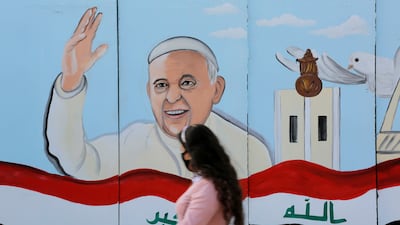It is a reflection of Pope Francis’s innate decency and ability to connect with people that some of the most heartfelt condolences on his recent death have come from leading figures outside the Catholic community. The UK’s King Charles III said he was "most deeply saddened" by the passing of the 88-year-old pontiff, while Indian Prime Minister Narendra Modi said Francis would always be remembered as “a beacon of compassion, humility and spiritual courage by millions across the world”.
In the UAE too, there has been sadness. President Sheikh Mohamed this week extended his condolences on the passing of a religious leader who “dedicated his life to promoting the principles of peaceful co-existence and understanding”. Sheikh Mohammed bin Rashid, Vice President and Ruler of Dubai, said Francis’s “legacy of humility and interfaith unity will continue to inspire many communities around the world”.
Other Arab leaders reflected on the Pope’s passing, with former Iraqi president Barham Salih, who greeted the pontiff in Baghdad in 2021, saying he was “deeply saddened”. In a letter to Cardinal Giovanni Battista Re, Dean of the College of Cardinals at the Vatican, Jordan’s King Abdullah II said Francis’s life had been “dedicated to justice and the pursuit of peace, working with humility and love for the benefit of all humanity”.

It is fitting that Pope Francis’s contribution to building bridges between faiths features so prominently in tributes from the Arab world. Although his historic visit to Abu Dhabi in 2019 was an important moment for the thousands of Catholics who live in the UAE, Francis’s work on the Human Fraternity Document – a blueprint for future generations to build a culture of mutual respect – underlined his commitment to common human values.
The Document was signed by Pope Francis and Dr Ahmed Al Tayeb, the Grand Imam of Al Azhar, at the Founder's Memorial in Abu Dhabi in the presence of Sheikh Mohamed bin Zayed and Sheikh Mohammed bin Rashid. Since then, the Document’s values have been put into action in the UAE through the Zayed Award for Human Fraternity, an annual accolade inspired by the philanthropic vision of UAE’s Founding Father, the late Sheikh Zayed bin Sultan Al Nahyan.
This $1 million award celebrates organisations and people whose work seeks to bring about meaningful change and improve lives. The prize recognises and supports the efforts of high-profile figures and grassroots campaigners alike, with previous winners including UN Secretary General Antonio Guterres and King Abdullah and Queen Rania of Jordan, as well as charitable foundations striving to help the needy from Haiti to Kenya and beyond.
The award is a timely continuation of that landmark meeting between Pope Francis and Dr Al Tayeb. In an interview with The National this week, Monsignor Yoannis Lahzi Gaid – a former aide to Pope Francis who served as the pontiff’s "Arabic voice" during his visit to the UAE – described the Document presented in Abu Dhabi that day as “the most important charter of interreligious dialogue ever signed by a pope … A beacon in the darkness of a world torn apart by terrorism, fundamentalism and hatred".
Such challenges, alongside economic inequality and climate change, will confront Francis’s eventual successor, too. This harsh reality makes it essential that the Catholic Church – as one of the world’s leading spiritual institutions – continues the work of outreach, engagement and dialogue exemplified by Francis’s visit to the Emirates six years ago. That would be a truly fitting legacy for an inspirational figure whose passing has deeply affected so many.




